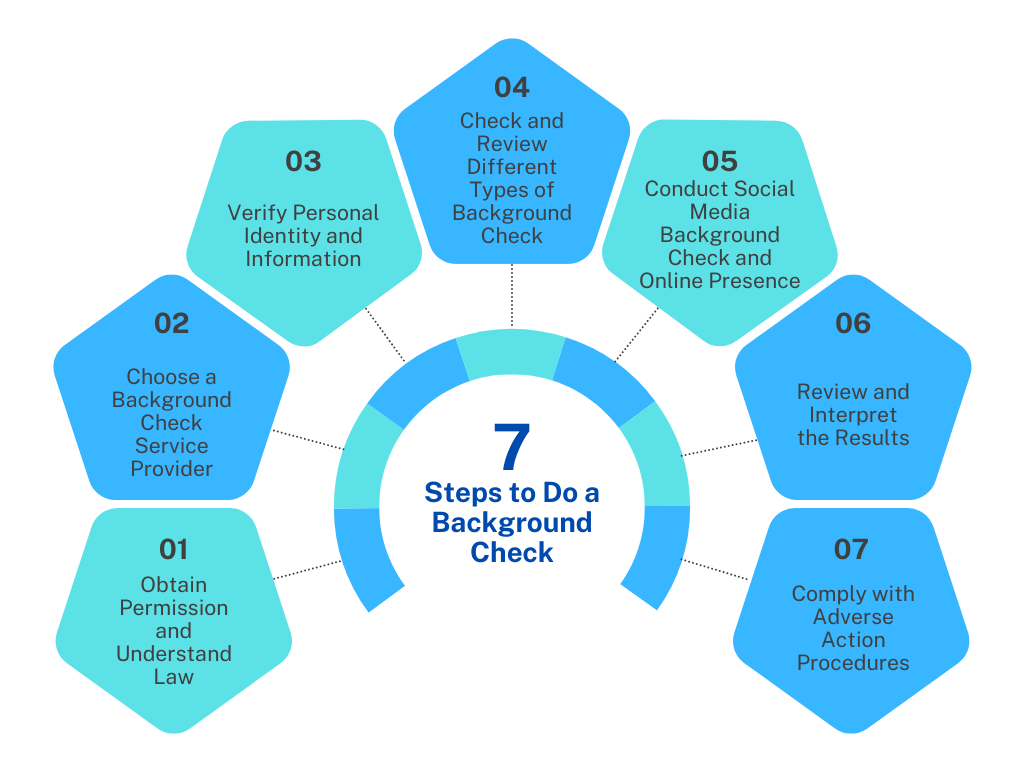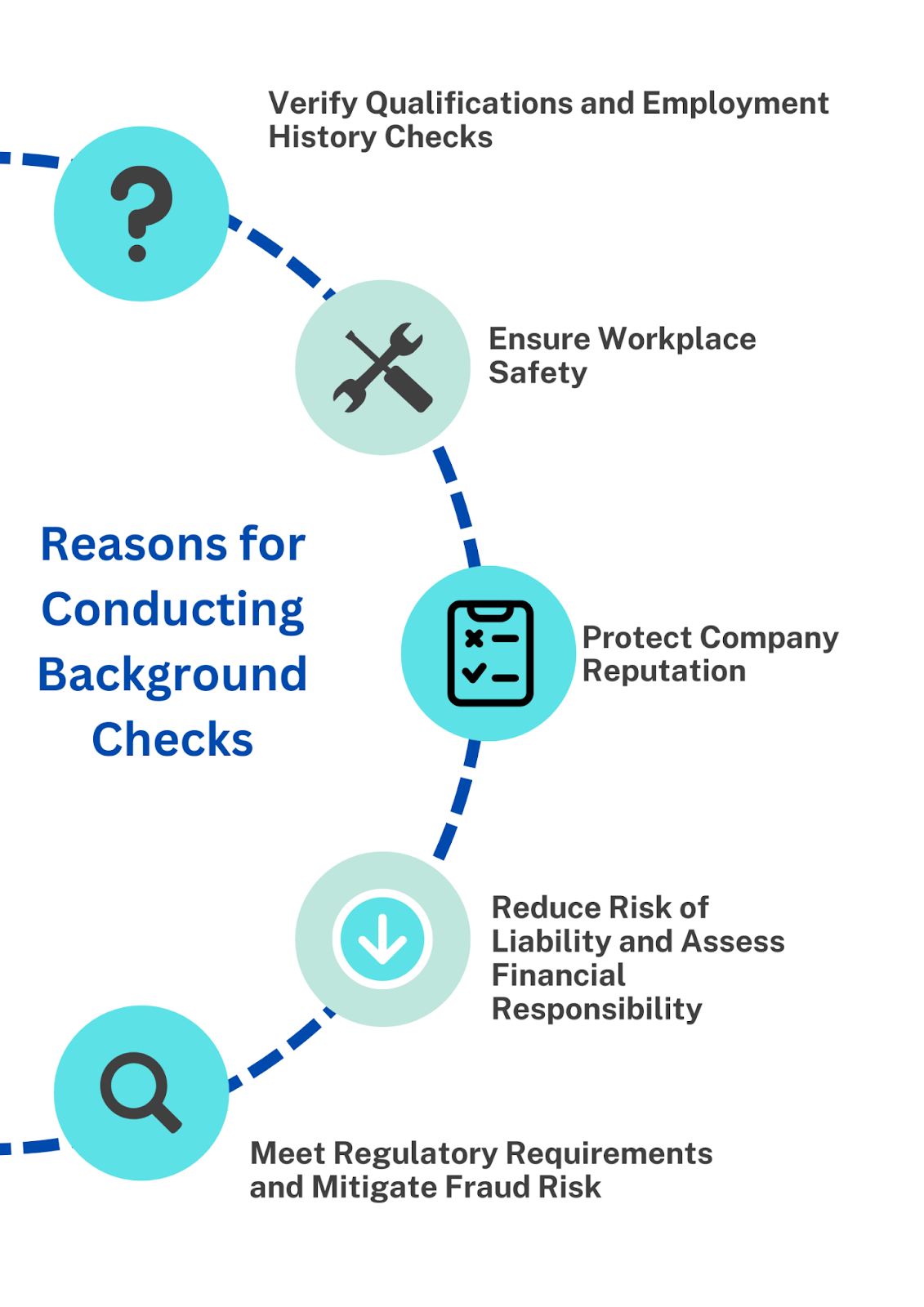How To Do A Background Check For Employment?
.webp)
In pre phases of hiring process, making informed decisions about employees is critical. Yet, many employers struggle with questions like: Is this candidate trustworthy? Will their history align with our company's values and standards? A bad hire can lead to wasted resources, potential legal risks, and even harm to your company's reputation.
If you’ve ever felt uncertain about navigating background checks, you’re not alone. Employers often face challenges like complying with legal requirements, choosing reliable screening methods, and interpreting results effectively.
This article will break down everything you need to know about conducting new employee background checks for screening potential employees , why they matter, and how tools like Ferretly’s Background check service with AI solutions can help you streamline the process. From verifying identity to understanding what raises red flags during a background check like pending charger we’ll guide you every step of the way.
Let’s ensure your hiring decisions are informed, efficient, and risk-free!
What Is a Background Check?
A background check is a process that helps employers verify the history and qualifications of employee. It involves gathering information about an individual’s past, including their identity, employment history, criminal records, and more.
According to the Federal Trade Commission, employers must follow specific regulations when conducting these background checks, ensuring they are fair and lawful.
How Do Employers Do a Background Check on Employees?

When conducting a background check, it's best practice to complete pre-employment checks before the employee's start date. Ideally, employers should carry out these checks after extending a conditional job offer to the candidate. This approach helps ensure that the process runs smoothly to legal requirements.
1. Obtain Permission and Understand Law
Before conducting a background check, employers must obtain the candidate's permission and ensure they are following a proper background screening policy.
Understanding the legal requirements, such as Ban the Box laws, is essential for ensuring compliance.
2. Choose a Background Check Service Provider
Choosing the right background check service provider is important for getting accurate and trustworthy information. Many background screening companies are increasingly adopting technology-based solutions.
For example, consider using a Background check with AI to improve efficiency and accuracy during the hiring process.
3. Verify Personal Identity and Information
The next step involves verifying the candidate's identity. This includes checking government-issued identification and confirming the individual's social security number to ensure that the information provided matches official records.
The next step is to confirm the candidate's identity. This includes checking government-issued ID and verifying the person's social security number to ensure that the information aligns with official records.
4. Check and Review Different Types of Background Check
Employers should consider various types of checks, such as:
- Criminal Background Check: Identifying any past criminal behavior, which includes criminal background checks for employment.
- Employment Verification: Confirming previous job positions and responsibilities.
- Educational Verification: Checking degrees and certifications.
- MVR Checks: Reviewing a candidate's motor vehicle records to identify any DUIs or driving-related offenses.
5. Conduct Social Media Background Check and Online Presence
Conducting a social media background check has become a valuable step in the hiring process. It provides insights to analyze candidate’s behavior, values, and professionalism that may not be evident through social media background checks. Reviewing public content on platforms like LinkedIn or Instagram can help employers identify red flags such as inappropriate behavior or inconsistencies in qualifications while confirming traits that align with company values.
Using tools like Ferretly’s AI-powered solutions can streamline this process, ensuring thorough analysis while adhering to privacy laws like the FCRA. A well-executed social media check can help employers make more informed hiring decisions while maintaining compliance. Learn more about the importance of Social Media Background Screening.
6. Review and Interpret the Results
Reviewing and interpreting background check results is a crucial step in the hiring process. Employers must carefully analyze the findings to assess whether a candidate meets the company’s hiring criteria without bias or haste. This involves examining any discrepancies in the candidate’s history, such as mismatches in employment records, unexplained gaps, or concerning social media activity, and determining their relevance to the role.
It’s important to approach this step objectively, focusing on factual evidence and avoiding assumptions. Employers should also consider the context of any negative findings, such as minor past offenses, and weigh them against the candidate’s overall qualifications and potential. Additionally, consulting legal or HR experts can ensure compliance with laws like the FCRA during this process. Thoughtful interpretation of results helps maintain fairness and prevents overlooking strong candidates due to misinterpretations.
alance in the hiring process.
7. Comply with Adverse Action Procedures
If a background check reveals concerning information, employers must comply with adverse action procedures. This process involves two steps:
A. Pre-Adverse Action
Before deciding on any actions regarding the candidate based on the background check results, employers must inform the candidate of the potential decision and provide them with a copy of the report.
B. Final Adverse Action
If the employer decides not to hire the candidate due to the background check findings, they must issue a final notice to the candidate. This notice should detail how the candidate can challenge the results.
For more guidance on this topic, check out our article on The Do's and Don'ts of Employment Background Checks.
Why Employers Run Background Checks?
An impressive 95% of employers with at least one U.S. location conduct one or more types of employee background checks. This widespread practice highlights the critical role of background screening in modern hiring processes. Background checks help maintain workplace safety, protect a company’s reputation, and ensure quality hires that contribute positively to organizational goals. Top Reasons Employers Conduct Background Checks:
Reasons for Conducting Background Checks

Employers perform background checks for several reasons, including:
- Verify Qualifications and Employment History Checks: Ensuring that candidates own the qualifications they claim.
- Ensure Workplace Safety: Protecting existing employees and the workplace environment.
- Protect Company Reputation: Avoiding hiring individuals with negative backgrounds that could harm the company’s image.
- Reduce Risk of Liability: Minimizing the risk of legal issues stemming from Irresponsible hiring.
- Meet Regulatory Requirements: Complying with laws and regulations regarding hiring practices.
- Assess Financial Responsibility (For Certain Roles): Understanding a candidate's financial background for positions involving financial responsibilities.
- Mitigate Fraud Risk: Preventing potential fraud by verifying a candidate's history.
What Does a Background Check Include?
Background checks typically involve various components. Background checks include checking some or all of the following for a job applicant: verifying identity, criminal background check, credit report, educational, certification, and credential verification, motor vehicle records, E-Verify confirmation, and fingerprint checks with the FBI.
Items Included in a Background Check
- Personal Identity Verification: Confirming identity details to avoid impersonation.
- Criminal History: Investigating past criminal behavior.
- Employment Verification: Checking previous job positions and roles.
- Education Verification: Confirming educational credentials.
- Credit Report (For Financial Roles): Reviewing financial responsibility for relevant positions.
- Driving Records (If Relevant): Checking driving history for roles requiring vehicle operation.
- Professional License Verification: Ensuring necessary licenses are current.
- Social Media and Online Presence: Evaluating the candidate's public persona online.
- Reference Check: Contacting former employers or personal references for further insights.
- Drug Testing (If Required): Conducting drug tests to ensure a safe workplace.
- Civil Records: Checking for any civil legal issues.
- Military Service Records (If Applicable): Confirming military background if relevant to the job.
Join 1000+ Customers Using Ferretly’s AI-Powered Background Checks
Ferretly offers advanced AI-powered background checks designed to help organizations streamline their hiring processes. By using our platform, companies can ensure thorough and reliable checks that go beyond traditional methods. Join the growing number of satisfied customers leveraging our innovative solutions.
Frequently Asked Questions
1. Is it legal to do a background check on someone?
Ethically and often legally, you must obtain permission before screening an individual. Therefore, you cannot carry out a background check without their approval.
2. How can I run a background check on someone?
Running a background check involves following legal procedures, obtaining agreement from the individual, and using a reliable background check service provider.
3. How Long Does a Background Check Take?
If there are issues with the information, background check may take longer to complete. background checks can take anywhere from a few days to several weeks, depending on the depth of the check and the speed of the responses from sources.
4. How Much Does a Background Check Cost?
The price of a background check varies based on the type of background check, the provider you select, and its complexity. It's wise to compare different services to find one that suits your needs and budget.
5. What Background Check Do Most Employers Use?
Most employers carry out several checks, such as looking into criminal history, confirming past jobs, and verifying educational qualifications. The exact checks done can differ based on the industry and the job being filled.
6. What Causes a Red Flag on a Background Check?
Red flags on a background check can come from criminal records, differences in employment history, negative references, or any information that challenges what the candidate said. Employers should take these flags into consideration based on the job and the company's rules.






